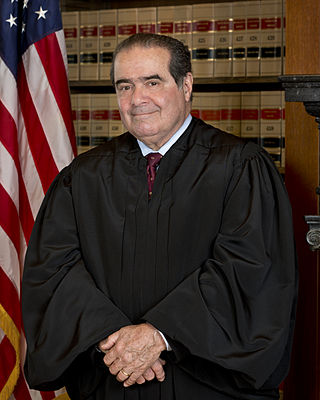
Antonin Gregory Scalia was an American jurist who served as an associate justice of the Supreme Court of the United States from 1986 until his death in 2016. He was described as the intellectual anchor for the originalist and textualist position in the U.S. Supreme Court's conservative wing. For catalyzing an originalist and textualist movement in American law, he has been described as one of the most influential jurists of the twentieth century, and one of the most important justices in the history of the Supreme Court. Scalia was posthumously awarded the Presidential Medal of Freedom in 2018, and the Antonin Scalia Law School at George Mason University was named in his honor.

Stephen Gerald Breyer is an American lawyer and jurist who served as an associate justice of the U.S. Supreme Court from 1994 until his retirement in 2022. He was nominated by President Bill Clinton, and replaced retiring justice Harry Blackmun. Breyer was generally associated with the liberal wing of the Court. He is now the Byrne Professor of Administrative Law and Process at Harvard Law School.

The Roberts Court is the time since 2005 during which the Supreme Court of the United States has been led by John Roberts as Chief Justice. Roberts succeeded William Rehnquist as Chief Justice after Rehnquist's death.

The Supreme Court of the United States handed down six per curiam opinions during its 2004 term, which began October 4, 2004 and concluded October 3, 2005.
Hudson v. Michigan, 547 U.S. 586 (2006), is a United States Supreme Court case in which the Court held that a violation of the Fourth Amendment requirement that police officers knock, announce their presence, and wait a reasonable amount of time before entering a private residence does not require suppression of the evidence obtained in the ensuing search.
Kansas v. Marsh, 548 U.S. 163 (2006), is a United States Supreme Court case in which the Court held that a Kansas death penalty statute was consistent with the United States Constitution. The statute in question provided for a death sentence when the aggravating factors and mitigating factors were of equal weight.

The Supreme Court of the United States handed down seven per curiam opinions during its 2003 term, which began October 6, 2003 and concluded October 3, 2004.

The Supreme Court of the United States handed down six per curiam opinions during its 2007 term, which began October 1, 2007 and concluded September 30, 2008.

The Supreme Court of the United States handed down nine per curiam opinions during its 2000 term, which began October 2, 2000 and concluded September 30, 2001.
Glossip v. Gross, 576 U.S. 863 (2015), was a United States Supreme Court case in which the Court held, 5–4, that lethal injections using midazolam to kill prisoners convicted of capital crimes do not constitute cruel and unusual punishment under the Eighth Amendment to the United States Constitution. The Court found that condemned prisoners can only challenge their method of execution after providing a known and available alternative method.
Kerry v. Din, 576 U.S. 86 (2015), was a United States Supreme Court case in which the Court analyzed whether there is a constitutional right to live in the United States with one's spouse and whether procedural due process requires consular officials to give notice of reasons for denying a visa application. In Justice Anthony Kennedy's concurring opinion, the controlling opinion in this case, he wrote that notice requirements “[do] not apply when, as in this case, a visa application is denied due to terrorism or national security concerns.” Because the consular officials satisfied notice requirements, there was no need for the Court to address the constitutional question about the right to live with one's spouse.




